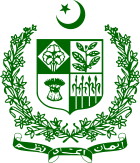- Council of Islamic Ideology
-
Pakistan 
This article is part of the series:
Politics and government of
PakistanConstitutionPresidentJudiciaryAdministrative units
Council of Islamic Ideology (Urdu: اِسلامی نظریاتی کونسِل) is a constitutional body responsible for giving legal advice on Islamic issues to Pakistan Government and the Parliament.
Contents
Functions
The council has following functions:[1]
- To recommend laws conforming to Qur'an and Sunnah to the Parliament and Provincial Assemblies.
- To advise Parliament or Government of Pakistan or President of Pakistan or Governor on any question referred to the Council as to whether a proposed law is or is not repugnant to the Injunctions of Islam.
- To make recommendations to bring current laws to conform to Islamic injunctions.
- To compiles guidance for Parliament and Provincial Assemblies.
However, Government can make a law before the advice is funished by the council. The council is also responsible for submitting an annual interim report, which is discussed in Parliament and Provincial Assemblies within six months of its receipt.[1]. Recently, the Council was strongly criticized in many traditionalist quarters for its recommendations on the procedure for khula. (See also Talaq (conflict)).
First members[2]
The council was then known as Advisory Council of Islamic Ideology. Its first eight members were:
- Justice Abu Saleh Muhammad Akram, former judge of Federal Court of Pakistan (Chairman)
- Justice Muhammad Sharif, former Judge Supreme Court of Pakistan
- Maulana Akram Khan, Dacca
- Maulana Abdul Hamid Badayuni, Karachi
- Maulana Hafiz Kifayat Husain, Lahore
- Dr. I. H. Qureshi, Head, Islamic Research Institute, Karachi
- Maulana Abdul Hashim, Islamic Academy, Dacca
- Another member from East Pakistan
Current members
Current members of the council are:[3]
- Maulana Sherani of JUI(F) — Chairman
- Rashid Ahmed Jalundhri
- Maulana Abdullah Khilji
- Manzoor Ahmad
- Mazher Saeed Kazmi
- Aqeel Turabi
- Muhammad Hanif Tayyab
- Sayyed M. Zakir Hussain Shah Sialvi
- Munir Ahmed Mughal
- Said Bibi
- Daman Ali Shah
- Javed Ahmed Ghamidi
- syed saeed ahmad shah gujrati
References
- ^ a b Official website, Functions of the council
- ^ History Council of Islamic Ideology. Retrieved 14 February 2011
- ^ Official website, Present Council
- Official website - Council of Islamic Ideology, Pakistan Government
External links
Categories:- Government of Pakistan
- Ideologies
Wikimedia Foundation. 2010.
